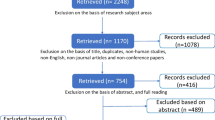Abstract
The purpose of this qualitative case study was to explore urban secondary students' preceptions of their school and community in teh changing economic and social context of postindustrial life. Students and teachers worked and played in a landscape which I have characterized as one ofurban abstraction, a term synthesized mainly from the work of Manuel Castells. The construct helps explain the complex, contradictory, and dynamic conditions of late-20th-century capitalistic life and their impact on the emotional and material realities of urban residents. It also helps to explain the reactions and negotiations in which students and teachers engaged in the face of a constant threat of violence and a lack of community within the school and its surrounding neighborhoods.
Similar content being viewed by others
References
Bettis, Pamela J. (1994). Deindustrialization and urban schools: Some theoretical considerations.The Urban Review 26:75–94.
Bettis, Pamela J. (1996). Urban students, liminality, and the post-industrial context.Sociology of Education 69: 105–125.
Bluestone, Barry, and Harrison, Bennett. (1982).The Deindustrialization of America. New York: Basic Books.
Brissett, Dennis and Snow, Robert. (1993). Boredom: Where the future isn't.Symbolic Interaction 16: 237–256.
Castells, Manuel. (1981). Local government, urban crisis, and political change. In M. Zeitlin (ed.),Political Power and Social Theory: A Research Annual, pp. 1–19. Greenwich, CT: JAI Press.
Castells, Manuel. (1983). Crisis, planning, and the quality of life: Managing the new historical relationships between space and society.Environment and Planning D: Society and Space 1: 3–21.
Castells, Manuel. (1985). High technology, economic restructuring, and the urban-regional process in the United States. In Manuel Castells (ed.),High Technology, Space, and Society, pp. 11–40. Beverly Hills, CA: Sage.
Castells, Manuel. (1988). High technology and urban dynamics in the United States. In M. Dogan and John Kasarda (eds.),A World of Giant Cities, pp. 85–110. New York: Sage.
Castells, Manuel. (1993). The informational economy and the new international division of labor. In Martin Carnoy, Manuel Castells, Stephen Cohen, and F. Henrique Cardoso (eds.),The New Global Economy in the Information Age, pp. 15–43. University Park: The Pennsylvania State University Press.
Cuba, Lee, and Hummon, David. (1993). A place to call home: Identification with dwelling, community, and region.The Sociological Quarterly 34: 111–131.
Davies, Bronwyn. (1993).Shards of Glass. Cresskill, N. J.: Hampton Press.
Denzin, Norman. (1970).The Research Act: A Theoretical Introduction to Sociological Methods. Chicago: Aldine.
Featherstone, Mike. (1993). Global and local cultures. In Jon Bird, Barry Curtis, Tim Putnam, George Robertson, and Lisas Tickner (eds.),Mapping the Futures, pp. 169–187. New York: Routledge.
Fine, Michelle. (1994).Chartering Urban Schools: Reflections on Public High Schools in the Midst of Change. New York: Teacher's College Press.
Giddens, Anthony. (1990).The Consequences of Modernity. Stanford, CA: Stanford University Press.
Glesne, Corrine, and Peshkin, Alan. (1992).Becoming Qualitative Researchers. White Plains, NY: Longman.
Goldsmith, William, and Blakely, Edwards. (1992).Separate Societies: Poverty and Inequality in U.S. Cities. Philadelphia: Temple University Press.
Harrison, Bennett, and Bluestone, Barry. (1988).The Great U Turn. New York: Basic Books.
Harvey, David. (1985).The Urbanization of Capital. Baltimore: Johns Hopkins University Press.
Harvey, David. (1989).The Condition of Postmodernity: An Inquiry into the Origins of Cultural Change. Cambridge, MA: Blackwell.
Johnston, Bill J. (1993). The transformation of work and educational reform policy.American Educational Research Journal 30: 39–65.
Kasarda, John. (1989). Urban industrial transition and the underclass. In William J. Wilson (ed.),The Annals of the American Academy of Political and Social Sciences 501, pp. 26–47.
Kincheloe, Joe. (1995).Toil and Trouble: Good Work, Smart Workers, and the Integration of Academic and Vocational Education. New York: Peter Lang.
Kincheloe, Joe, and McLaren, Peter. (1994). Rethinking critical theory and qualitative research. In Norman Denzin and Yvonne Lincoln (eds.),The Handbook of Qualitative Research, pp. 138–157. London: Sage.
Kretovics, Joseph, Farber, Kathleen, and Armaline, William, (1991). Reform from the bottom up: Empowering teachers to transform schools.Phi Delta Kappan 73: 295–299.
Lather, Patti. (1991).Getting Smart: Feminist Research and Pedagory with/in the Postmodern. New York: Routledge.
LeCompte, Margaret, and Preissle, Judith. (1993).Ethnography and Qualitative Design in Educational Research. San Diego: Academic Press.
Mathison, Sandra. (1988). Why triangulate?Educational Researcher 17 (2): 13–17.
McDowell, Linda. (1991). Restructuring production and reproduction: Some theoretical and empirical issues relating to gender, or women in Britain. In Mark Gottdiener and Charles Pickvance (eds.),Urban Life in Transition, pp. 77–105. Newbury Park, CA: Sage.
Noyelle, Thierry, and Stanback, Thomas. (1983).The Economic Transformation of American Cities. Totowa, NJ: Roman & Allanheld.
Ray, Carol, and Mickelson, Roslyn. (1993). Restructuring students for restructured work: The economy, school reform, and non-college bound youths.Sociology of Education 66:1–20.
Sassen, Saskin. (1990). Economic restructuring and the American city. In W. R. Scott and J. Blake (eds.),Annual Review of Sociology, pp. 465–490. Palo Alto, CA: Annual Reviews.
Stanback, Thomas. (1985). The changing fortunes of metropolitan economies. In Manuel Castells (ed.),High Technology, Space, and Society, pp. 122–142. New York: Sage.
Weis, Lois. (1990).Working Class without Work. New York: Routledge.
Wexler, Philip. (1987).Social Analysis of Education. New York: Routledge.
Wexler, Philip. (1988). Symbolic economy of identity and denial of labor. Studies in high school number 1. In Lois Weis (ed.),Class, Race, and Gender in American Education, pp. 302–315. Albany: SUNY Press.
Wexler, Philip. (1992).Becoming Somebody: Towards a Social Psychology of School. Washington, DC: Falmer Press.
Zukin, Sharon. (1987). Gentrification: Culture and capital in the urban core.Annual Review of Sociology 129–147.
Zukin, Sharon. (1991).Landscapes of Power: From Detroit to Disney World. Berkeley: University of California Press.
Zukin, Sharon. (1995).The Culture of Cities. Cambridge, MA: Blackwell.
Author information
Authors and Affiliations
Additional information
Ramela Bettis is an Assistant Professor in the Department of Educational Foundations, Leadership, and Technology at Auburn University, where she teaches courses in qualitative research methods and educational foundations.
Rights and permissions
About this article
Cite this article
Bettis, P.J. Urban abstraction in a central city high school. Urban Rev 28, 307–333 (1996). https://doi.org/10.1007/BF02367325
Published:
Issue Date:
DOI: https://doi.org/10.1007/BF02367325




